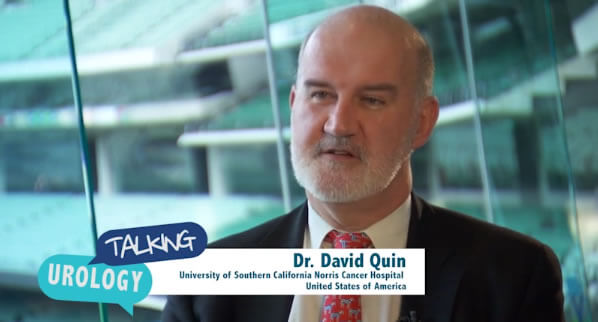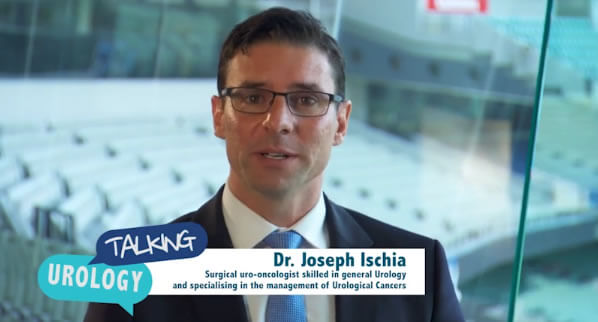USANZ 2017 – Dr Ian Vela
Dr Ian Vela is a Urologic Oncologist in the Department of Urology Princess Alexandra Hospital in Brisbane, and a Senior Research Fellow at the Australian Prostate Cancer Research Centre.
Dr Ian Vela gives an Australian perspective on neoadjuvant and adjuvant treatments for high risk prostate cancer.
Talking Urology podcast transcript
USANZ 2017 Interviews – Ian Vela
This is Talking Urology.
Joseph Ischia: I caught up with Ian Vela, who’s a uro-oncologist and clinician scientist from Brisbane to give us some Australian insights. James just gave us a great talk on why neoadjuvant and adjuvant treatments might be coming through, is there any chance it’s going to be different in Australia?
Dr. Ian Vela: Well, I think a lot of the points that James made in his talk were excellent and they really do apply to Australia, but we’ve got a slightly different wrinkle, if you will, in the current environment in potentially high-risk prostate cancer and that we have a new novel imaging technology that’s really taken off in Australia in the form of PSMA PET/CT and PET/MRI which North America hasn’t really embraced at this point in time. So, I think we are potentially using that as a routine staging of men with this sort of high-risk disease and we can potentially identify with greater accuracy men who have potentially metastatic disease, the lymph nodes, which obviously changes their risks profile compared to standard-of-care imaging which is really used for a lot of the trials in the US and even Europe at this point in time. So, the question is what do we do with those men who have potentially positive nodes on our advanced imaging compared to the standard of care, and can we then potentially use those imaging technologies to then enroll men in trials such as neoadjuvant chemotherapy or for further trials?
Joseph: So, we can enrich outpatient populations to those that are more likely to respond?
Ian: Correct, and one of the issues obviously with even the CALGB trial that Dr. Eastham was talking about is that those men essentially have known metastatic disease by definition to be enrolled, but they’re higher risk so there’s a proportion of men who probably won’t benefit from having neoadjuvant chemotherapy. If you can potentially use either a genomic risk profile or like Decipher, that is a test in the US, it’s not available in Australia, but that indicate a high likelihood of recurrence after definitive therapy or marker metastatic disease picked up on advanced imaging. If we enrich for those men maybe we will show that there’s a signal for neoadjuvant chemotherapy in the right patients and improve survival in our men.
Joseph: I know one of your areas of interests is precision medicine looking at the genetics in liquid biopsies. What do you think of the PARP inhibitors?
Ian: So, I think as James correctly identified, the likelihood of a large number of men benefiting from genomic testing for BRCA mutations in localized advanced disease or high-risk disease is going to be low. It is going to be a small proportion. Obviously, the cohorts of families that have known to have BRCA mutations, that’s very useful tests. We know as you get advanced disease that has been multi-treated metastatic disease, the DNA mismatch repair pathway is increased and enriched so up to 30% of advanced patients who got metastatic disease that has been heavily pretreated may benefit from targeting that pathway, but I think in high-risk localized disease it’s going to be a relatively small population of men that will benefit from that particular test.
Joseph: And I know you do a lot of research with organoids, could they be used to identify people that might despond to PARP inhibitors or certain neoadjuvant treatments prior to their surgery?
Ian: I think with regard to localized disease that’s a very big challenge in our metastatic cohort absolutely and that’s what where my research is involved, in looking at that advanced disease or early recurrent disease. Localized disease is a technical challenge to grow in the lab and probably it’s not going to be as useful in this particular cohort. So, I think some of the genomic tests may be useful and I think also our precision imaging may be useful.
Joseph: And in the metastatic disease, how do you see that organoids have been useful?
Ian: Well, so the hope is that if we can take metastatic deposits either through biopsy or liquid biopsy, we can therefore test in the lab different drugs to test sensitivities and therefore predict hopefully what actual drug may be useful to treat a patient with before actually giving it to the man. So, we avoid overtreating men unnecessarily with drugs that won’t work. We can also do genomic and transgenomic analysis and looking at the actual gene expression and mutations and things, and if we are able to target specific aberrations then we may be able to really improve outcomes, as we always say the right drug at the right time for the right patient. So, that’s the sort of the mantra we use.
Joseph: You embody precision medicine. Fantastic, Ian. Thanks very much.
Ian: No, it was fine. Cheers.










